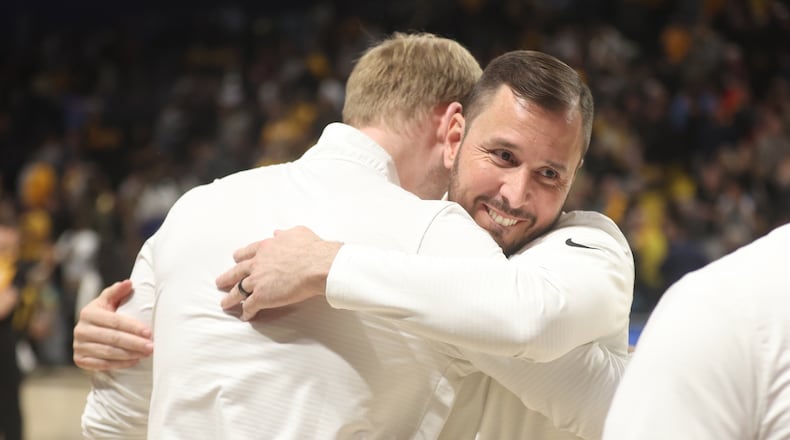Grant watches game film religiously, Kane said, as does Steve Prohm, who Kane coached under at Murray State and Iowa State.
Kane also worked for Matt McMahon at Murray State, and McMahon has a quote Kane still uses.
“There’s no such thing as being too organized,” Kane told the podcast hosts, Doug Caputo and Alan Major, “so I try to be as organized as possible.”
Kane starts by briefly analyzing teams on KenPom.com. He wants to get an idea of what teams are trying to do. How good are they? What do they do well?
“I really don’t dissect the analytics until the end,” Kane said, “But to begin I just want to get a feel because analytics only tells you a certain story.”
Kane then starts watching film. He’s old school, he said, and knows younger coaches are quicker and more efficient in the scouting process.
“I have a process,” Kane said. “I have a checklist, and I can do my own clips. So I watch the game. I’ll clip it. I’ll do all that. I want to watch the tendencies and the flow of the game and the substitution patterns at first, and I’ll clip the game as I go.”
Kane learned this method from Bucky McMillan, who’s now the head coach at Texas A&M.
“He made it very simple,” Kane said. “There’s four quadrants, right? There’s press offense. There’s half-court offense. There’s press defense. Then there’s half-court defense. But in each of those quadrants, I add probably about five or six bullet points for my checklist.”
Kane also listens to postgame press conferences, hoping opposing coaches drop hints about the way they play.
“When you’re doing scouts, you need to learn from the head coach of the opposing team,” Kane said. “If they’re playing a team that’s similar to us, and in their postgame, they explain just a little bit in how they attack them ... I think postgame press conferences are extremely important. That’s something I’ve picked up on over the years.”
Kane breaks down an opponent and then presents three spreadsheets to Grant.
“I would have an offensive attack spreadsheet,” Kane said. “This is what they do in these quadrants defensively, and this is how we’re going to attack them offensively. And then I’ll have a defensive prep sheet . These are all their actions offensively — transition, ball-screen actions, post D, all this stuff — and this is how we’re going to defend them. These are our principles. It’s not about the play. It’s about the principles and the concepts. How are we going to defend them? What are the rules?"
Every position group has a set of rules to follow on defense, Kane said.
“After that, I would have a special-situation sheet for Anthony,” Kane said. “This is what they do. This is what we can do. And then I think this is very important, I would have an adjustment sheet. What are our adjustments when this stuff doesn’t work? And during the game, I would write some ideas of adjustments down, and I would have them at halftime.”
Another key part in preparation, Kane said, is knowing how the players on the team learn. Every team is different. There are visual learners. Some players need to walk through plays on the court to understand them. Kane doesn’t want to overload players. He gives them the information in bursts.
Two days before a game, Dayton coaches present the players with three keys to the game. They put together a two-minute video on the opponent “to show what they do and to show how to stop them.”
During the scouting process, Kane watches at least five games of opponents.
“I’ve scouted coaches who keep me up at night,” he said. “There’s some great ones out there. Bill Self (of Kansas) is phenomenal, and I don’t think he gets enough credit for the adjustments he makes. In my time in the Big 12, Bruce Weber (formerly of Kansas State) had a lot of misdirection to where you didn’t know what was coming.”
Kane said he studies coaches from a distance. One coach he respects tremendously is Shaka Smart, of Marquette, who Dayton played last year and will play again this season.
“The way he’s evolved over the years,” Kane said, “and the players that he’s had and the culture that he’s built in every program is something that I try to study.”
Early in the podcast, Kane talked about Ja Morant, the Memphis Grizzlies star who was an unranked prospect when Kane started recruiting him to Murray State in 2016. Kane also played a big part in Dayton landing Jalen Crutcher, the first recruit of the Grant era in 2017.
Kane, a 2005 University of Florida graduate from Oakland Park, Fla., coached under Grant in that first season eight years ago but then left to work for Prohm at Iowa State for three seasons. When Prohm was fired by Iowa State in March 2021, Kane returned to Dayton for the 2021-22 season.
Kane offered advice to young coaches near the end of the 48-minute podcast.
“I would tell young coaches in this business, ‘Humble yourself,’ because this business will humble you quick,” Kane said. “There are a lot of great coaches out there. Just learn from each other. But approach this thing with some humility because if you’re in this long enough, you’re eventually going to get fired. I’ve been through it. I know multiple people who have been through it. Everything happens for a reason. Maybe you hit reset and reevaluate things and find a different version of yourself, and then you get better and you brush yourself off and you get back in it.”
Credit: David Jablonski
Credit: David Jablonski
About the Author


